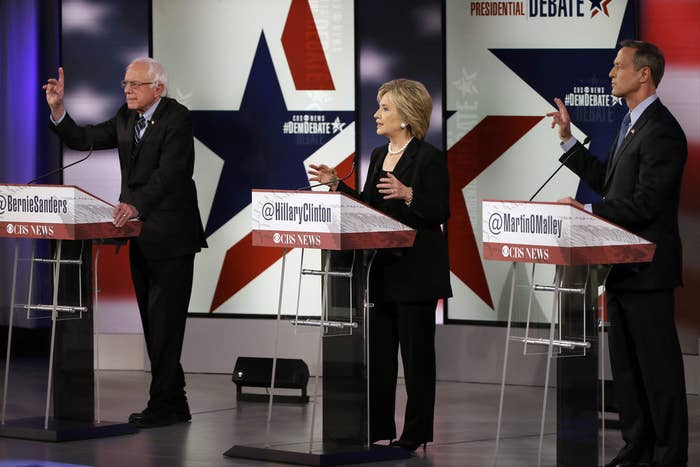
The second Democratic debate got off to a somber start Saturday as the three remaining candidates took turns denouncing the terrorist attack in Paris and vowing to bring the full power of the United States to bare in the war against ISIS.
Sen. Bernie Sanders, who represents the more doveish wing of the Democratic party, set the tone for the debate in his opening statement, saying that he was "shocked and disgusted" by the attack and vowing that "this country will rid our planet of this murderous organization that is called ISIS."
Former Secretary of State Hillary Clinton argued "This is election is not only about electing a president, it's about choosing our next commander in chief." She added that she will begin laying out changes she would pursue to U.S. policy on the war against ISIS and other terrorists.
Likewise, former Maryland Gov. Martin O'Malley called for a renewed effort against ISIS, but insisted the U.S. must work more collaboratively with countries in the Middle East. "This is the new face of conflict and warfare … [and] we must be able to work collaboratively with others" and anticipate attacks, O'Malley said.
But while O'Malley stressed the front and center role the United States must play, Clinton — who has been harshly criticized over her support of the Iraq war — was clearly wary of pushing for a massive new U.S. combat role. While she argued "we summon our resources … and all of the tools at our disposal," Clinton repeatedly insisted that "it cannot be an American fight … we will support those who take the fight to ISIS."
Indeed, both O'Malley and Sanders used the opening round of the debate to attack Clinton's support of the Iraq war. "I would argue that the disastrous invasion of Iraq … is something that has unraveled the region completely and led to the rise of Al Queada and ISIS," Sanders said.
Clinton repeatedly sought to brush off the criticism, arguing variously that it is too complex a region to blame the war to arguing ultimately the rise of ISIS came because the administration's hands were tied by decisions of the previous White House. "We abided by the agreement George W. Bush made with the Iraqis … unfortunately, Nouri al-Maliki set about decimating it," Clinton said.
For his part, Sanders stuck by his belief that climate change is the greatest national security threat facing the country, going so far as to say it has led to the rise of ISIS. Absolutely … climate change is directly related to the growth of terrorism," Sanders insisted.
Meanwhile, Clinton also called for a renewal of the Authorized Use of Military Force resolution in the wake of the Paris attack. The 2001 law has been harshly criticized for being used to wage a sweeping war against terrorists across the globe, but neither the administration nor Congress has demonstrated much appetite for a new vote. Still, Clinton said she hopes the Paris attacks means "maybe now we can get it moving again and upgrade it."
